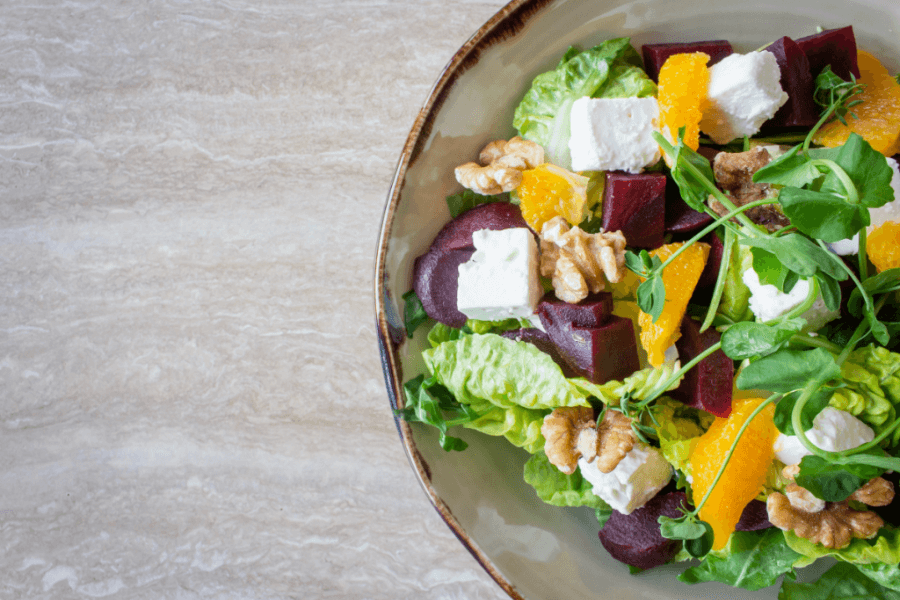It’s coming up to that time of year again, where we have over-indulged over the holidays and we are starting to come up with our dreams for the new year. Usually health, health, fitness and weight loss will be in there at some point and inevitably some people are going to be looking at diets.
When shopping for a new dietary solution, I hear people getting into impassioned arguments about what diet is currently working for them; vegan, paleo, low GI, Intermittent Fasting and the list goes on. It’s amazing, they have never felt so good, and they want everyone else to feel good so start evangelising.
But how do you tell the fact from the fiction, the hype from the healthy and where do you start?
My inbox is full of questions from people about diets so I thought I would collate all my pointers here to help you out. Whilst I don’t believe there is a single diet that will be suitable with for everyone experiencing period problems, there are some things that you can look for to avoid fads or getting stuck in a rut.
1. Make Smaller Incremental Changes Over a Longer Period of Time
Any diet that relies on heavy restriction for a short period of time is such as a very low calorie diet is not sustainable, can mess up your leptin levels and doesn’t teach you good, healthy habits. There are so many meal replacement weight loss plans where people lose weight, but put it back on within 2 years because they couldn’t keep up the strict regimen (I have also experienced this myself).
Dramatic weight loss can also cause issues with the hormone leptin, which detects when your body is losing weight and sends signals to your brain when it detects severe weight loss.
You may also find your period disappears and you start getting other hormonal imbalances that appear from under nourishment and consuming too little energy for your energy output (exercise).
In today’s world, our hormones need as much help as possible, and trying to fool out bodies just doesn’t work in the long run.
Instead, look at making changes slowly and over time. Adding a side salad to a main meal, switching chocolate and baked good snacks to fruit, veg, hummus, nuts and seeds, adding more vegetables into your meal.
Doing these over time helps your body get used to new foods and after a while, you will forget that your dinner was sausage and mash (potatoes for those of you not used to that abbreviation) and evolved in to sausage with a jacked potato, sausage with jacket potato and vegetables, and is now a balanced meal.
Your gut also needs time for changes in foods as the bacteria that help to break down one food, cannot break down others. So, for example when you suddenly decide to increase your vegetable intake to be healthy and eat 5 more portions a day straight away, every day, you will get gas, bloating and even abdominal pain as you don’t yet have the bacteria to help break it down and it starts fermenting on its own.
Adding in one extra portion of veggies per meal for two weeks and then adding in another portion is the way to go. It gives our ecosystems inside our digestive tract time to evolve and keep up with the change with minimal negative side effects.

2. Focus on Nutrients Over Calories
So many diets focus on the amount of calories you are consuming, but not about what nutrients your body needs, not just as a minimum to get through each day, but the optimum you need to live a healthy and thriving life.
Think about a colourful plate of vegetables with all those different micronutrients, good quality fats and proteins. When you fill up on these foods, you naturally need a lot more of these foods to increase the calorie count. Foods high in calories, are often low in nutrients. So just start looking at what food you are eating and what benefits you get from it and you will get a sense for what can really help you.
If you fill up on the nutrient dense foods, you are more likely to be satisfied before reaching out for the confectionary (candy). I can honestly say, I have yet to meet anyone who binged out on carrots and broccoli mindlessly, whilst watching a movie, so get your crudités, nuts, seeds and fruit snacks ready for movie night.
3. Avoid Anything “Low Fat”
Fats (specifically cholesterol) are needed for making hormones. You need fats, but good quality fats such as coconut, olives and avocados are wonderful for periods, hormones and reproductive health.
When you restrict fats, you restrict your body’s ability to make hormones. They are essential for the body to be able to use fat soluble vitamins, which are again essential for a fully working, healthy reproductive system.
Also, foods that are low in fat often have other substitutes in them to make them resemble what you would expect from that food, such as more sugar or salt to match the preferred taste or consistency. Some products contain carrageenan, a seaweed and algae derived additive which can thicken yogurts and dairy type sauces which can cause digestive issues for some people.
Finally, fats, in particular unsaturated fats, can help increase the feeling of satiety. Not enough fat can mean that you are still hungry. Unsaturated fats are found in certain nuts, seeds, avocado and oily fish.

4. Not ALL Carbs Are Bad
Seriously we need the hashtag #notallcarbs
I’m sure, if you are here, and you are reading this, you have read many health and wellness articles by now about going low carb or no carb. I’d like to give you a little background as to where that message came from (in my experience in this area).
Complex carbohydrates that use processed flour such as bread, pasta and cake can cause issues with insulin and blood sugar regulation in some people. Cut these out and replace with fruit, vegetables nuts, seeds and healthy, good quality fats and proteins and this can help. They are also nutrient poor food and the gluten in them can cause irritation for some people.
Other “white carbohydrates” such as grains, cereals, and white potatoes can be a healthy part of a balanced diet for some people and for others, cause insulin problems. I notice that people talk about these as “carbs”.
In the age of social media, I see people talking about the above issues with these specific carbs and somehow, it gets turned into all carbohydrates, including vegetables, nuts, seeds and fruits causing these issues. Yes fruit and in particular fruit juice can raise blood sugar and insulin and be problematic, but if in a small portion in comparison to vegetables and other plant foods, it can be managed by the body.
Again some people find nuts and seeds difficult to digest, pro tip for all grains, cereals, nuts and seeds is to pre-soak and if necessary dry out to help with digestion. The message has gone from processed carbs, to all white carbs to carbs in general.
So, in summary, whilst there are energy dense carbohydrates which offer little in the way of nutritional benefit such as any sugary foods, bread, pasta and potatoes, that doesn’t mean all carbs are bad. In fact, we need a good intake of carbohydrates such as vegetables, beans, legumes and fruits which contain so many nutrients that our bodies need for micronutrient levels to remain optimal.
5. Pause Before Trying Anything, If You Are Unsure Or Are Feeling Pressured & Seek Professional Guidance
Not all diet schemes with replacement products are bad, but some are not great and the people making commissions out of selling you the product directly may be pressuring you into a decision that isn’t the right one for you (it may be great for them).
It’s hard when a friend is really enthusiastic and would like you to support their business, or refers you on to someone, but check out what training they had. In general, if they are trained as coaches or weight loss experts by the company they are working for, their information may be heavily biased.
The same is true for people who have changed their diets and had huge successes. They are so happy with their own changes and want others to feel good too, it can feel like they are preaching at you.
Quick tip: if someone’s nutritional information all comes from one source, it is likely to be biased, so look for a diversity and inclusions of clinical citations.
If you don’t have the knowledge to work out whether something you are being pressured to purchase is right for you or seems a little off, or can’t afford to speak to a nutrition or dietician, don’t forget you can see your primary care practitioner and ask them to monitor your health and wellbeing whilst on any dietary plan.
You should always speak with your doctor before undergoing, any dietary or exercise plan incase you have underlying conditions or are on medications that can cause issues. I will also point out that doctors usually get very limited nutrition training in their initial training and a lot of it can be out of date, however, they can help you decide whether information you are given is helpful and evaluate whether your progress is in the best interest for your health.
Taking a breathing space, even if that means having a difficult conversation and saying no, not now, and holding off contact can be very beneficial in checking in with how you really feel about what is presented to you. That way whether you decide to opt in or out, it is coming from a place where it was your choice, not where you felt pressured or manipulated.

I hope these pointers are a useful start. I highly recommend that you seriously think about these points before starting any “diet plan”.
If you want specific advice to you and your situation, I offer private 1-2-1 health coaching for women, and I also have a course on healthy eating basics, that comes with recipes that might be on interest to you if you are reading this..
Whatever nutritional choices you make, remember that there is plenty of support out there on the internet these days and a number of unqualified people offering well meaning but not so great advice, especially on various social networks. So, do ensure that if you are outsourcing your health, that it is to someone who knows what they are talking about.
And finally, it is important to remember, you are your own health detective, and what works for you may not be suitable for anyone else and vice versa. So if you have tried doing a specific diet with a friend and it didn’t have the same effect, don’t worry about it, you are different people. And this changes at different times in your life too, so be gentle with your body as you get older.
Wishing you a fantastic 2016.




